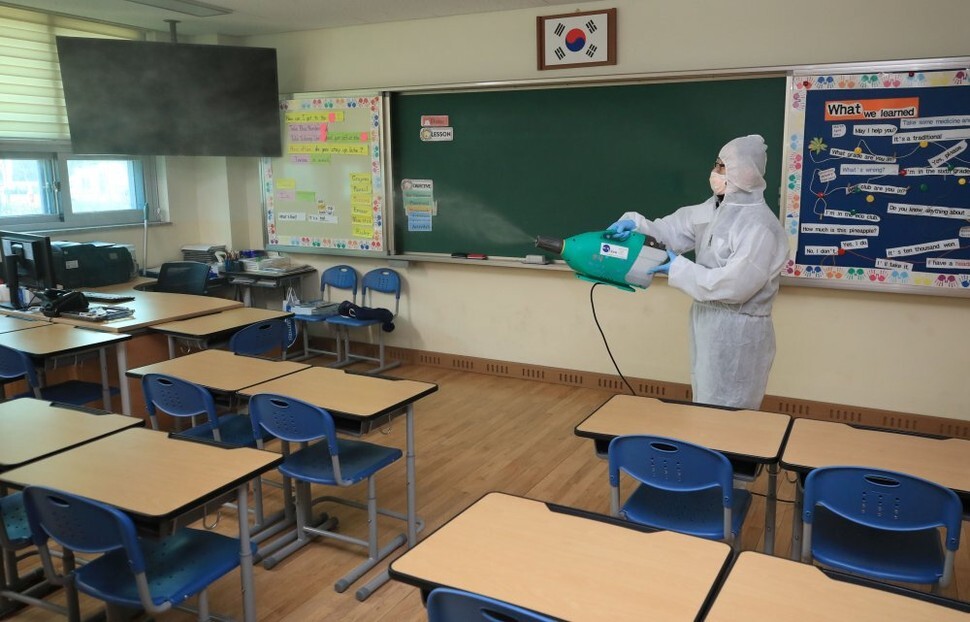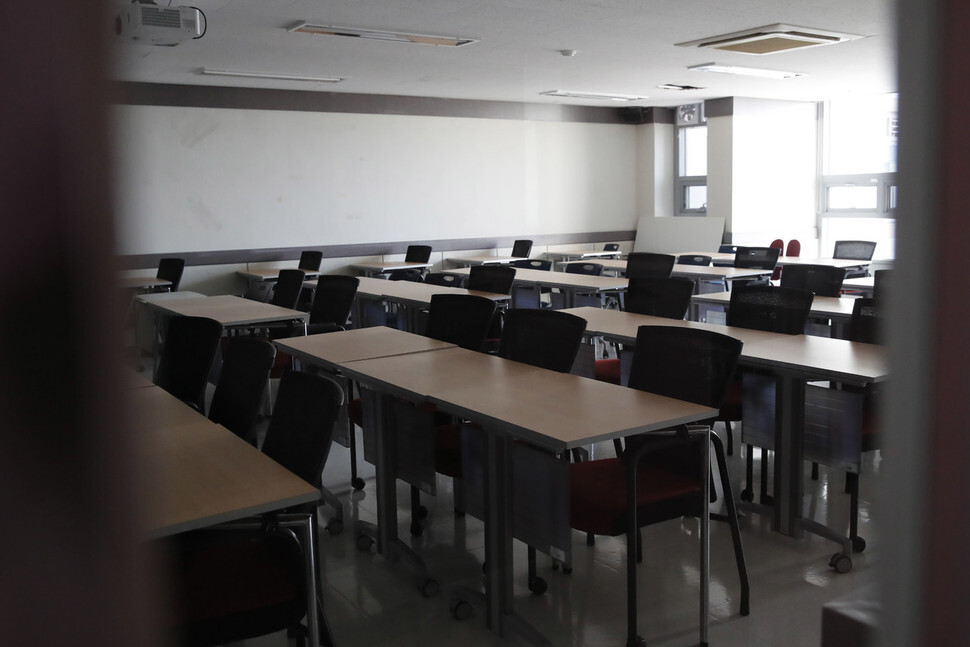hankyoreh
Links to other country sites 다른 나라 사이트 링크
Spring semester to be pushed back again to Apr. 6 amid coronavirus concerns

Amid the continuing novel coronavirus pandemic, it’s becoming more likely that the spring semester at kindergartens and elementary, middle, and high schools around South Korea, which had been scheduled to begin on Mar. 23, will be delayed once again, until Apr. 6. The delay would be an attempt to prevent schools from serving as a vector for transmission of COVID-19, the disease resulting from the novel coronavirus. But taking the unprecedented step of delaying classes at all schools around the country for more than a month would have a number of serious consequences. Schools would be unable to meet the legally mandated number of class days, undermining students’ learning, and the absence of childcare would continue to put a strain on working parents.
“We’re considering a number of options for extending vacation in kindergartens and elementary, middle, and high schools. We’re planning to announce whether [the semester will be delayed further] on Mar. 16 or 17,” South Korea’s Ministry of Education said on Mar. 15. The government has already delayed classes twice because of the outbreak. But since the disease continues to spread as the new semester opening on Mar. 23 approaches, the government is forced to consider a further delay. Though there have been few cases of COVID-19 among children or teenagers, there are serious concerns that schools could be a vector for local transmission of the disease.
“Children and teenagers are likely to function as a cohort that quietly spreads [COVID-19] or amplifies its transmission,” said Kwon Jun-wook, deputy director of the Korean Centers for Disease Control and Prevention (KCDC) and director of the National Institute of Health.
There are also concerns about whether schools would be able to respond appropriately to cases that might occur there if the semester opens as scheduled. Those concerns were the focus of a meeting of school superintendents from cities and provinces around the country and infectious disease experts that was recently organized by the Ministry of Education.
“While we haven’t decided on when the semester will start, we are preparing guidelines for preventing transmission after classes begin. Those guidelines will take into account the unique circumstances at each school,” said Minister of Health and Welfare Park Neung-hoo, who also serves as first vice director of the Central Disaster and Safety Countermeasures Headquarters (CDSCH).
An additional delay of the semester would represent a fundamental change of the situation. Previous delays meant using scheduled vacation days in advance, but an additional delay would mean reducing the number of legally mandated class days (180 for kindergartens and 190 for elementary, middle, and high schools).

Shortening the number of class days could have particular consequences for middle and high school students. If the semester begins in April, it might not be feasible to hold midterm exams, which could create problems for students submitting their high school transcripts for university applications. It could also affect the schedule of the College Scholastic Ability Test (CSAT), Korea’s all-important university entrance exam. As a result, some education offices have already recommended that schools substitute performance assessments for midterm exams.
Another concern is that delaying the semester would extend the gap in childcare for students in kindergarten and the lower grades of elementary school. While the educational authorities are providing emergency childcare for parents with children 8 years old and below, the application rate and the actual usage rate are both very low. Some parents are leery of having their children cared for in a group setting amid an outbreak of infectious disease, while others are dissatisfied with the meager program offered by the childcare providers.
Working parents on their own in finding childcare optionsWith the public sector out of action, parents are left to their own devices. While some parents have asked family members to temporarily look after children while they’re out of school, that approach would be hard to maintain for more than a month. Other big questions are whether to pay irregular workers and other employees at schools during the vacation and whether private kindergartens should refund tuition.
While some have suggested staggering the beginning of the semester in each region depending on the extent of the outbreak there, the educational authorities are holding to the principle of taking uniform measures that apply to the entire country. Infectious disease experts have reportedly communicated their support for that principle to the Ministry of Education. As a result, the Ministry is expected to either go ahead with opening classes on Mar. 23 or delay the semester further, until Apr. 6.
On a related topic, a considerable number of the universities that had delayed the beginning of classes on the recommendation of the education authorities began their new semesters on Mar. 16. But most of these universities are planning to avoid in-person classes for the next two weeks and to hold classes online.
By Choi Won-hyung, staff reporter
Please direct comments or questions to [english@hani.co.kr]

Editorial・opinion
![[Column] Season 2 of special prosecutor probe may be coming to Korea soon [Column] Season 2 of special prosecutor probe may be coming to Korea soon](https://flexible.img.hani.co.kr/flexible/normal/500/300/imgdb/original/2024/0426/3317141030699447.jpg) [Column] Season 2 of special prosecutor probe may be coming to Korea soon
[Column] Season 2 of special prosecutor probe may be coming to Korea soon![[Column] Park Geun-hye déjà vu in Yoon Suk-yeol [Column] Park Geun-hye déjà vu in Yoon Suk-yeol](https://flexible.img.hani.co.kr/flexible/normal/500/300/imgdb/original/2024/0424/651713945113788.jpg) [Column] Park Geun-hye déjà vu in Yoon Suk-yeol
[Column] Park Geun-hye déjà vu in Yoon Suk-yeol- [Editorial] New weight of N. Korea’s nuclear threats makes dialogue all the more urgent
- [Guest essay] The real reason Korea’s new right wants to dub Rhee a founding father
- [Column] ‘Choson’: Is it time we start referring to N. Korea in its own terms?
- [Editorial] Japan’s rewriting of history with Korea has gone too far
- [Column] The president’s questionable capacity for dialogue
- [Column] Are chaebol firms just pizza pies for families to divvy up as they please?
- [Column] Has Korea, too, crossed the Rubicon on China?
- [Correspondent’s column] In Japan’s alliance with US, echoes of its past alliances with UK
Most viewed articles
- 1‘We must say no’: Seoul defense chief on Korean, USFK involvement in hypothetical Taiwan crisis
- 2Why Kim Jong-un is scrapping the term ‘Day of the Sun’ and toning down fanfare for predecessors
- 3Two factors that’ll decide if Korea’s economy keeps on its upward trend
- 4BTS says it wants to continue to “speak out against anti-Asian hate”
- 5After election rout, Yoon’s left with 3 choices for dealing with the opposition
- 6Gangnam murderer says he killed “because women have always ignored me”
- 7South Korea officially an aged society just 17 years after becoming aging society
- 8AI is catching up with humans at a ‘shocking’ rate
- 9Ethnic Koreans in Japan's Utoro village wait for Seoul's help
- 1046% of cases of violence against women in Korea perpetrated by intimate partner, study finds